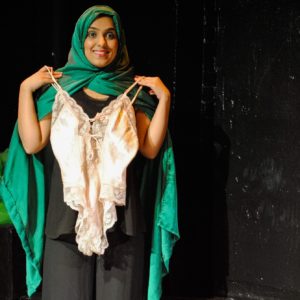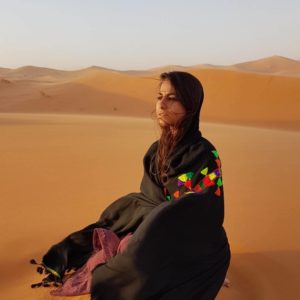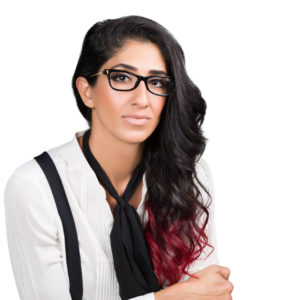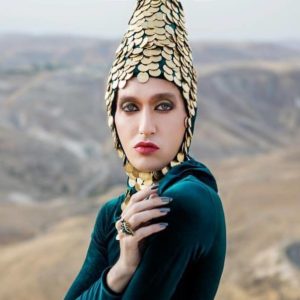As an Iranian-American I love both my cultures and enjoy sharing them with others. That passion has allowed me to discover and write about other people such as artists, musicians and activists who are equally enthusiastic about sharing their dual identity.
Artists like Puerto-Rican singer, writer, rapper, actress and producer Maria Isa Perez-Hedges. The international recording artist and Boricua (BO-REE-KWA) was born in Minnesota and grew up in St. Paul’s West Side barrio, where she was influenced by different rhythms of Afro-Latino-Indigenous culture, says her bio. Today, the young artist uses her cultural roots to educate others about her heritage.
I first met Maria during her October 2019 performance at the National Museum of American History’s event for Hispanic Heritage month: Latino Arts, Beats and Culture. Her show was part of the museum’s program: Latinos in Hip-Hop, which included a panel discussion about Latinx music with guest speakers Felix Contreras, Gil Gastelum, Ashley Mayor, DJ Dave Nada and Marlysse Simmons.
Before the program, I had never heard the term Latinx and was fascinated by the guest panelists’ discussion about its origins, its growth and its influence on other Latin artists.
Each of the panelists highlighted how different cultures in the Latin community, such as that of Puerto Ricans have contributed to Latinx by introducing their own rhythms and beats. They also discussed how various Latin musicians such as renowned guitarist Carlos Santana inspire today’s generation of Latinx artists, musicians and DJs.
What I believe makes the Latinx community so unique however is that it’s not just a group of people sharing their pride for their culture but also their personal experiences of growing up in America with a dual identity. A feeling I thought Isa and I could relate to.
After the panel discussion, Isa took to the stage and started to play a pair of congas and sing. Right away, I was blown away by her voice and lyrics, which described her personal upbringing in Minnesota, her pride for being Puerto Rican and how she considers herself a Latina activist. Stories I also could connect with, as an Iranian-American who grew up in the South.
Once her performance ended, I approached her and said, ‘keep doing you’ and thought how cool it was to meet someone else who is equally passionate about sharing her culture with others.
Weeks later I caught up with the young Latin artist for a Skype interview about what it was like growing up with a dual-identity, where she draws her inspiration from, and how she’s continuing to promote Latinx.
Photo credit: Jordan Strowder
How would you describe your style of music?
I don’t have genre, I don’t like to say it’s just hip-hop, because I rap and do so much more. But it’s like if Prince had a baby with Rosie Perez.
It’s influenced from the migration of my family, it’s Puerto Rican, it’s African, it’s the funk of Minneapolis, it’s the rap of New York City and I would consider saying it’s eclectic.
Where do you draw your inspiration from?
It’s just being able to express everything from experiencing it, or experiencing it maybe through your friend venting to you about something. I am also a teacher and work with children, and seeing what they have to survive and the traumas they are surviving and how we are surviving them together.
Another influence is just location.
I think Minnesota may have been predominantly White growing up. But right now our numbers are really going up because of the Latino demographic and the African population here, and the influence of all of these different cultures has been able to help us to deal with the struggles and movements, to be able to unify. And we unify under the music and drum.
Music is an international language and I think through struggle there is also celebration. And a part of the struggle here also happens to be the temperature, so we tend to want to heat it up on stage and in the studio when we are cooking music. We want to make people happy too and don’t want to just talk and sing about sorrow.
What is the creative process like for you?
It’s meditation, some people go to pray in church or in temple but I use the stage as a way for me to vent and celebrate but also to connect with folks. And knowing that we’re human and knowing that folks may not understand, but they are willing to listen to my story or they can also connect it to theirs.
Do you ever doubt your own creativity?
Yes, there are days where you scribble on a piece of paper and throw it in the garbage bin or it’s going back to the drawing board. But I have been fortunate to surround myself with ambitious artists and producers who believe in each other. So, it’s really easy to work on your craft when the vibe is right.
But honestly, it’s my favorite thing to do, it comes naturally. You know, you’re going to put me into a room full of kids and I’m going to make music with those kids. If there is a spoon and a plate, I’m just going to make a beat out of it. I think it’s just being able to utilize your resources.
What would you say to people who like your music but disagree with the politics?
I would say that is your honest opinion. You have the right to feel the way you feel and you can either turn the dial to the next song, or refuse to listen to me ever again or not support me. But that’s how I feel, that’s how I have been educated. Instead of sashaying off, I would actually want to maybe have a little conversation as to why they feel that way.
They may have a view of the world that has never been a part of my world because of their privilege. So, my world as an artist is like, hey, I can’t change your mind or your ways but I can educate you as to why I feel the way I feel.
Photo Credit: Justin Schell
What was it like growing up in Minnesota as a Puerto-Rican?
I don’t know what it feels like to not identify with my tribe, my culture. The reality of it is that I have always been treated differently even though I was born in Minnesota.
You know, going to the mother land, going to Puerto Rico, you are treated as, ‘oh you’re Puerto Rican but you’re from over there’. And in then in Minnesota you are being taught by majority Caucasian culture that’s here and discriminates against other ethnicities, starting first with the natives of this land.
So, you know I think the reason why I am so attached to recognizing my culture and identifying with who I am is because I feel safe, I feel at home, I feel comfortable and it also keeps you warm because Minnesota is cold!
As a Boricua and as a Puerto Rican I am able to identify with what keeps us strong and that’s our movement, whether we are on the island or we are in New York City, where a majority of Puerto Ricans live. But when you are in Minnesota and there are not that many of you here, instead of trying to shelter that growing up, my family held it as pride.
I don’t know if you have ever seen My Big Fat Greek Wedding and wondered, ‘why is everything so Greek’? I connected with that, like why is there a big Puerto Rican flag in your uncle’s car? Or why are you always singing your music or playing your drums? It’s like we are a reflection of our ancestors who have survived so much and their survival has allowed me to gain strength to deal with the indifference and the inequalities that many Puerto Rican women and so many women of color face all over the world.
So how was it for me growing up?
I am fortunate that I was able to get a better education than many of my cousins living on the island. Or being able to have access to healthcare, even though it’s a battlefield here.
You have to recognize your privileges even among the disparities. And so with those privileges of being in Minnesota, yes we deal with racism, yes we deal with inequalities. But you also find yourself bridging with other ethnicities, with other multicultural groups and recognizing that we can build together. It’s brought me to be the story teller I am today, through my music.
Speaking of which, what drew you to music?
Nothing drew me, I feel like I was born into it.
My grandparents were musicians and my mother served as a human rights activist my whole life; working on social justice and inequity. That’s what drew me into hip-hop. As a hip-hop artist, I am able to express activism through lyricism.
I also have been playing drums since I was five years old in a family cultural group that my mom started. She also started a performing arts school with my aunt.
My aunt also was a performer, she was a singer and dancer who studied both in Puerto Rico and in New York. She influenced me in how to be comfortable in creating a craft and expressing myself through art. And my mom worked her ass off so we could have those resources available to us as women.
Speaking of women, how has your mom influenced your career?
She’s believed in me and she allowed me to do what I want to do. She has recognized a lot of herself in me. And sometimes I hear from peers of mine about how their parents regret not accepting their talents, or how they disliked seeing them or tried to change them. I haven’t had that with my mom, it’s not like I’m testing my mom’s ears. We’re both in this equation together.
She’s educated me to be strong and bold but to also recognize that there are consequences in trying to fight for liberation. She has also taught me values which I am committed to everyday. And I’m recognizing those values even more, now that I am a mom to a little girl. It’s really just doing what you can to provide. And it doesn’t have to be financial. It really has to be with faith.
My grandmother was that woman to her and me while she was in this world. And I think it’s like, now here is the torch. It’s now like, ‘Mom, you’ve done so much that I want you to relax. You have a crown, so own it. You may not feel it or know you have it’. And I’m like, ‘Rock that shit, flash that, you deserve it. You are a survivor influencing me to continue to survive and be even stronger to a beautiful little girl’.
I really hope that this generation realizes that there is a way to function even if your cell phone doesn’t work one day. I think my mom taught me that, and it’s helped me to survive.
What are some current projects you’re working on?
I am currently working on new material with different global sounds. My last project, “Salsa Sounds,” was influenced by my mother and women of color, and I think this new album is too. But it’s more experimental and more of a hands-on production.
Last time, I was able to work for a solid producer, Jay Hardy, and we were able to create a sound that was his. But now I am really focused on creating these little skits that turn out to be songs. It’s about what it means to be a 30-something woman.
I’m thinking about how can I influence more artists, or the girl who was me when I was 15 and I was in the studio for the first time. That’s the goal. Let’s get really wicked and wild and take my sound somewhere it’s been but hasn’t gotten this far.
I am also a type-one diabetic and have been insulin dependent since I was 16 years old. A lot of my work right now involves helping people who have this illness and are unable to afford the medicine.
I have been fundraising between that and raising money for Puerto Rico. There were several hurricanes that hit the island recently, so it’s about being prepared and being able to heal the wounds that are still open.
There are 200 schools that have shut down in addition to a number of hospitals. So, my mission in the twin cities is to lobby for affordable healthcare, and my mission internationally is working toward building more schools in Puerto Rico.
Will there ever come a time when you’re not educating people about your identity through music?
I don’t believe there will ever be a time for that. I grew up reading a lot of Maya Angelou, who wrote what was in her heart until she was in her 80’s. And what was in her heart was the soul of her ancestor. She talked about love and she talked about survival as a black woman.
Not every song is the same and not every message in my songs is the same. But I think that my listeners know that if I am putting it down on paper, it’s fact. I’m keeping it 100 percent all the time.
Photo credit: Marshal Long





Leave a Reply